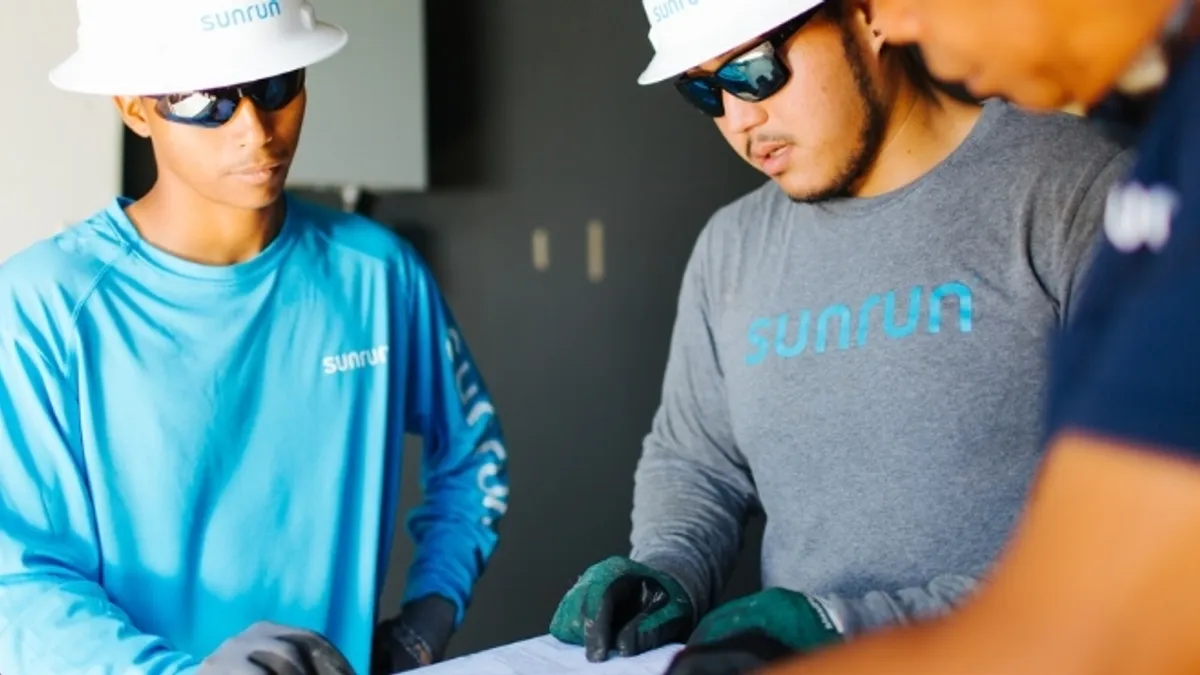Dive Brief:
- Sunrun sees a bright future in deploying its solar-plus-storage option to provide grid services, as the company's leaders on Monday announced a pipeline of deals in half of its operating regions for programs like virtual power plants.
- After a second quarter loss due to COVID-19 impacts, Sunrun executives told analysts on the company's Q2 earnings call that demand for their products persists and battery storage adoption will increase as prices continue to fall and blackouts continue throughout the country.
- Grid services, such as employing distributed solar-plus-storage as a virtual power plant (VPP), are "gaining more traction," CEO Lynn Jurich said on the call. Utilities are marketing to their customers about resilience benefits on Sunrun's behalf, she said. But many VPP deals in the making are around pilot programs — "it's not going to be a huge revenue line item for 2021."
Dive Insight:
Sunrun estimates increased customer adoption of its storage options due to the consumer "pain point" from storms and outages.
Last week, a hurricane downgraded to a tropical storm led to blackouts across the Northeast. Michael Weinstein, Credit Suisse analyst, asked on the earnings call how such blackouts impacted product demand, "especially in New England."
"If you just think about numbers, there's 1.3 million New Jersey residents [who] didn’t have power; in California, last year, there’s 2.5 million that lost power... [I]f you think about the market size available to us in places where people have felt real restrictions in terms of how they are living, I think that will increase adoption considerably," Jurich said.
In the second half of 2020, Sunrun plans to come out with a 15% lower cost battery option — its first price improvement seen quarter-to-quarter in the technology.
Due to coronavirus impacts to sales and installation channels, the company had one of its worst quarters for distributed energy deployment in the last two years. Sunrun deployed 78.1 MW in Q2, as opposed to 102.7 MW in the same quarter last year. The amount of customers and leases deployed in the quarter also decreased.
The declines were in-step with reports from the Solar Energy Industries Association of slowdowns with residential deployment of rooftop solar during the public health crisis.
The company took a net loss for the quarter of $13.6 million, or $0.11 per share, according to earnings filings on Monday. Second quarter total revenue decreased 11% year-to-year, to $181.3 million, while solar energy systems and product sales revenue decreased 33% year-to-year, at $75.2 million.
Sunrun is preparing for the eventuality of a second-wave of COVID-19 restrictions and risks by pivoting its sales team to a digital format and instituting installer safety practices, Jurich said. The developer is not restricted from installing anywhere currently, although installations at some large retail stores have dragged as those locations "were not fully ramped back in."
Sunrun announced in July an acquisition of Vivint Solar for $3.2 billion, which is expected to close in the fourth quarter. Vivint has not had the same level of penetration in the residential storage market as Sunrun, which provides an opportunity to offer storage pairings to new customers. According to Jurich, Vivint's direct-to-home sales model is "quite supportive of these grid services-type programs."














